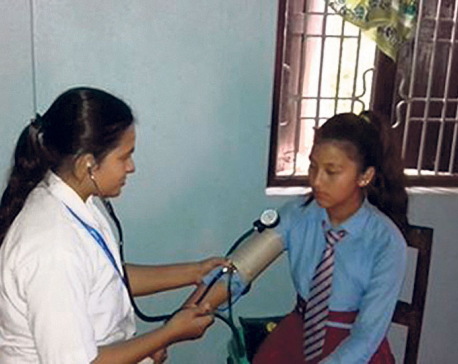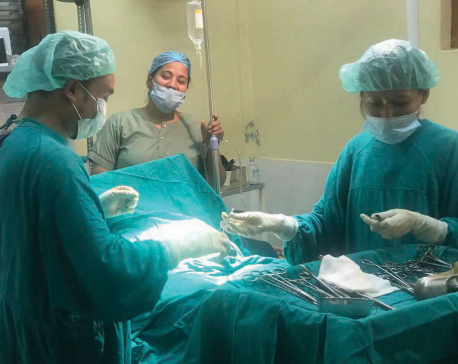
OR
Rising cases of C-section mar women's reproductive health
Published On: May 25, 2019 05:05 AM NPT By: Sonam Lama
KATHMANDU, May 25: According to the latest research conducted on women's reproductive health, the cases of Caesarean section (C-section) delivery in Nepal are on the rise. As per the medical records, Bharatpur Hospital of Province 3 was found to have performed the highest number of C-sections in pregnant women. Of the 9,282 institutional births, 3,426 (37 per cent) had taken place through C-sections in fiscal year 2075/76.
At an interaction session held in the capital on Friday, women health specialists and activists discussed the status of women health rights, medication and challenges in the country. President at Midwifery Society of Nepal, Laxmi Tamang claimed that women are likely to have a c-section without necessity in many cases of delivery in the country. She highlighted the lack of cesarean section audits, monitoring and assessment. Whether the pregnant women require a c-section is highly questionable in the country's context, thus, resulting in the growing cesarean delivery in Nepal, she said.
The World Health Organization suggests that the ideal rate for caesarean section is 10% but acceptable up to 15%. However, the national data shows the rising rate of C-section births.
Many studies have shown that women who have undergone a cesarean section without medical necessity are at higher rates of infection, pain, pre-hospitalization, breast feeding challenges and complications in future pregnancies and death of child bearing women. “As WHO also suggests, spreading awareness on the women's reproductive health rights and the hazards of early marriage to women and couple is highly significant for safe motherhood,” added Tamang.
The situation of women in remote areas like Rolpa seems dire as medical facilities are out of their reach which takes its toll on the lives of both mothers and children. “Women's health talks start from menstruation and ends at menopause. We have barely gotten a holistic picture of how women deal with these health challenges in their daily lives,” said PhD Researcher on women health, Sachin Ghimire.
“The situation and status of public health is largely neglected from policy making to implementing level. Women in critical condition are denied access to emergency helicopter services while it is not so in the case of political leaders,” added Ghimire.
Since the country's developmental structure in various districts highly varies from each other, he further suggested that frequent research and update on women's health is crucial. “The idea of equity and equality should be practiced in order for the women from remote areas to understand women health in every respect,” added Ghimire.
You May Like This

Nurses don’t want to work at rural schools
SINDHULI, Dec 8: Despite the government's announcement of the ambitious 'One School, One Nurse' program, the campaign has not been... Read More...

Rolpa doctors perform cesarean delivery with mobile flashlights
ROLPA, Aug 18: When she heard that the baby in her womb is having difficulty to breathe and needed to... Read More...

Province 3 allows 50 local units to purchase ambulances, fire trucks
MAKAWANPUR, April 23: The Province 3 government has permitted 50 locals units to procure ambulances, fire extinguishers, and mortuary vehicles. Read More...

Just In
- World Malaria Day: Foreign returnees more susceptible to the vector-borne disease
- MoEST seeks EC’s help in identifying teachers linked to political parties
- 70 community and national forests affected by fire in Parbat till Wednesday
- NEPSE loses 3.24 points, while daily turnover inclines to Rs 2.36 billion
- Pak Embassy awards scholarships to 180 Nepali students
- President Paudel approves mobilization of army personnel for by-elections security
- Bhajang and Ilam by-elections: 69 polling stations classified as ‘highly sensitive’
- Karnali CM Kandel secures vote of confidence


















Leave A Comment